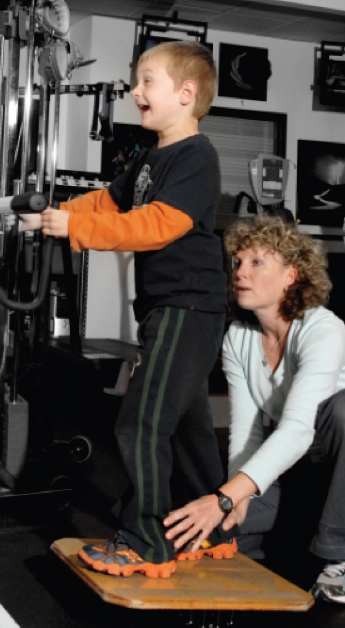BALANCE & VESTIBULAR

Balance Is Key
Balance may be the most important component of high-level function because it is the foundation of all movement.
Balance is a combination of 3 senses: vision, vestibular, and proprioception (sense of body position).
The vestibular system is deep inside the inner ear and responds to changes in speed or direction of head and body movement.
Proprioception is related to the receptors system that is located in our joints and muscles that tell us about our body’s position in space.
Losing Balance
When one or several of these components change with age or injury, one can experience balance challenges.
Our focus is mainly on the proprioception and vestibular system. To remain balanced, one must be able to reach outside their center of gravity with stability. We can help you improve your balance to prevent falls and advance your athletic ability with progressive exercises that expose you to numerous combinations of foot positions, reaches, unstable surfaces, obstacle navigation, ladder drills, jumps, hops, leaps, and speed variations — depending on your skill level.
Vertigo
 One of the most common causes of acute dizziness that can be assessed and treated in physical therapy is called Benign Paroxysmal Positional Vertigo (BPPV). If you experience dizziness when rolling in bed, turning your head, or tipping your head back, please contact your doctor for a referral and come see us for treatment of this common but treatable form of vertigo.
One of the most common causes of acute dizziness that can be assessed and treated in physical therapy is called Benign Paroxysmal Positional Vertigo (BPPV). If you experience dizziness when rolling in bed, turning your head, or tipping your head back, please contact your doctor for a referral and come see us for treatment of this common but treatable form of vertigo.
Symptoms of BPPV include head spinning, nauseousness, and unsteadiness. Patients with BPPV usually experience vertigo when they turn over in bed, get in or out of bed, look up to a high shelf or put their head back in the shower. These are circumstances where there is a large change in the orientation of the head with respect to the pull of gravity. Patients often become imbalanced or unsteady when they get up from bed and try to walk and may even fall. They are occasionally quite ill with nausea, vomiting and other motion sickness like symptoms.
The onset of BPPV may be abrupt and frightening. Patients may even think they are having a stroke. Whenever they tilt or tip their head, they can experience extreme vertigo, imbalance, and may even fall out of bed. If they are up and around and tilt their head back or forward, they can fall to the ground. The usual course of the illness is a gradual lessening of symptoms over a period of weeks to months. Occasionally the symptoms can last for years.
While the hallmark of BPPV is episodic vertigo associated with changes in head position, many patients also have a mild degree of constant unsteadiness during the periods when they are also having the recurrent attacks of positional vertigo.
Staff [learn more]

Physical Therapist
Physical Therapist
Physical Therapist

PT Assistant
FACEBOOK[like us]
[custom-facebook-feed]Who We Are [learn more]
Based in Yakima, Pro-Motion Physical Therapy and Functional Fitness helps patients and fitness center members seize the connection between mind, body and spirit in order to achieve better. © 2024 Pro-Motion Physical Therapy. All Rights Reserved
Powered by Performance Builders

Live Telehealth Services
For Back, Joint and Muscle Pain
- Musculoskeletal Primary care
- Physical Therapy
- Screening
- Second Opinions
- Advice and Consultation
for Appointment, or click here to learn more.
PATIENT INTAKE FORM
For your convenience you may print out the forms and bring them with you to your appointment or you may fill them out on line. If you choose to fill them out on line please remember to click submit and the forms will be sent directly to our clinic. Thank you.
ONLINE FORM PRINT FORM





